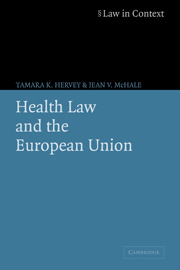Book contents
- Frontmatter
- Contents
- Acknowledgements
- Table of abbreviations
- Table of conventions and treaties
- Table of EU legislation
- Table of national provisions
- Table of cases
- Part One
- Part Two
- 4 Access to health care services
- 5 Data protection and health information privacy
- 6 Regulation of health care professionals
- 7 The regulation of clinical research
- 8 Regulating pharmaceuticals: risk, choice and compensation
- 9 Public health law
- Part Three
- Bibliography
- Index
6 - Regulation of health care professionals
Published online by Cambridge University Press: 10 December 2009
- Frontmatter
- Contents
- Acknowledgements
- Table of abbreviations
- Table of conventions and treaties
- Table of EU legislation
- Table of national provisions
- Table of cases
- Part One
- Part Two
- 4 Access to health care services
- 5 Data protection and health information privacy
- 6 Regulation of health care professionals
- 7 The regulation of clinical research
- 8 Regulating pharmaceuticals: risk, choice and compensation
- 9 Public health law
- Part Three
- Bibliography
- Index
Summary
Introduction
The regulation of health care professionals has a long and ancient history. The teaching and practice of physic and surgery dates from the days of Hippocrates and the works of Galen (131–201 AD). The Salerno School, a group which had settled in Salerno in Italy in AD 900, not only taught medicine but, it is believed, was the first to confer doctorates. Overt occupational control is illustrated through the operation of licensing procedures observable in certain European countries as long ago as the sixteenth century. Today, statutory regulation of health professional bodies is common across EU Member States. Our concern in this chapter is with the extent to which EU law has affected such regulation. As we will see, such effects have so far been limited, marginal and mainly indirect. They will probably remain so, unless significant cross-border movements of patients alter the political imperative for Member States to coordinate or even harmonise their regulatory standards.
Before we explore interactions between the EU's legal order and those of its Member States in the regulation of health care professionals, we need, briefly, to develop some parameters concerning who is a “health care professional”, and set out what elements constitute the “regulation” of such health care professionals. Our starting point here is that “health care professional” is a broader category than that of “doctor”. Different approaches have been advanced for identifying professions, including the health care profession.
- Type
- Chapter
- Information
- Health Law and the European Union , pp. 189 - 236Publisher: Cambridge University PressPrint publication year: 2004



